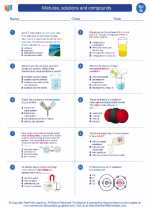Unicellular Organisms
Unicellular organisms are living things that are made up of only one cell. These organisms carry out all of the functions of life within a single cell. They can be found in almost every environment on Earth, including water, soil, and air.
Characteristics of Unicellular Organisms
- Size: Unicellular organisms are usually very small, often microscopic in size.
- Structure: They have a simple structure, with a cell membrane, cytoplasm, and genetic material.
- Metabolism: Unicellular organisms carry out all of the necessary life processes within a single cell, including obtaining nutrients, exchanging gases, and getting rid of waste.
- Reproduction: They reproduce asexually through processes such as binary fission or budding.
- Examples: Examples of unicellular organisms include bacteria, archaea, some types of algae, and protozoa.
Study Guide
Here are some key points to remember about unicellular organisms:
- What does it mean for an organism to be unicellular?
- What are the main characteristics of unicellular organisms?
- Can you provide examples of unicellular organisms?
Answer: Unicellular organisms are made up of a single cell that carries out all life functions.
Answer: Unicellular organisms are small in size, have a simple structure, carry out metabolism within a single cell, and reproduce asexually.
Answer: Examples of unicellular organisms include bacteria, archaea, some types of algae, and protozoa.





